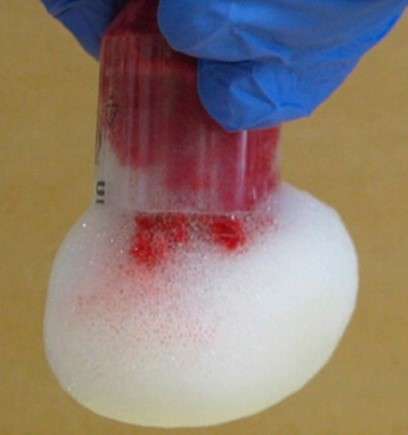Sprayable foam that slows bleeding could save lives

Traumatic injuries, whether from serious car accidents, street violence or military combat, can lead to significant blood loss and death. But using a material derived from crustacean shells, scientists have now developed a foam that can be sprayed onto an open wound to stop the bleeding. They report their successful tests on pigs in the journal ACS Biomaterials Science & Engineering.
For some serious injuries to arms and legs, medics can apply pressure to keep bleeding in check. But for major trauma to the torso, particularly when it affects vital organs, compression can make the situation worse. Currently, first responders have no way to stop this kind of bleeding, which is a leading cause of death among young adults and the most common cause of death from combat-related injuries. Srinivasa R. Raghavan, Matthew B. Dowling and colleagues wanted to find a simple way to treat these wounds quickly.
The researchers developed a sprayable foam made of modified chitosan, a biopolymer derived from the shells of shrimp and other crustaceans that is already being used in other types of non-foam wound dressings. In tests on pigs, the spray reduced blood loss by 90 percent.
More information: "Sprayable Foams Based on an Amphiphilic Biopolymer for Control of Hemorrhage Without Compression." ACS Biomater. Sci. Eng., 2015, 1 (6), pp 440–447 DOI: 10.1021/acsbiomaterials.5b00067
Provided by American Chemical Society


















